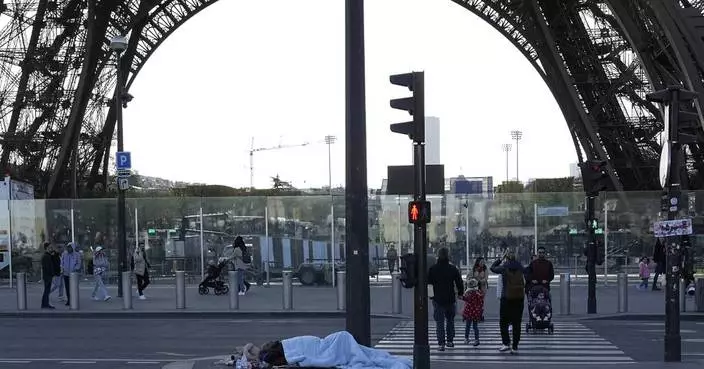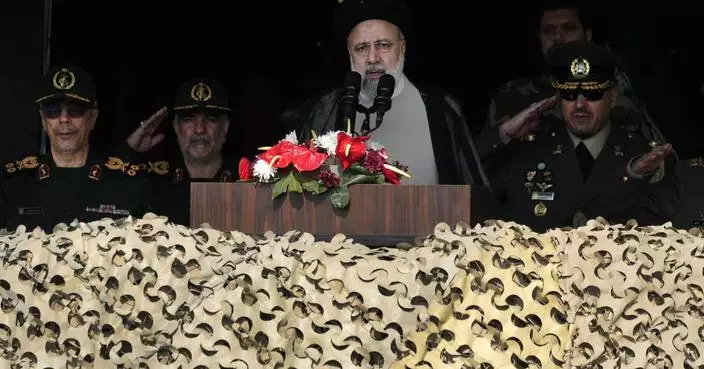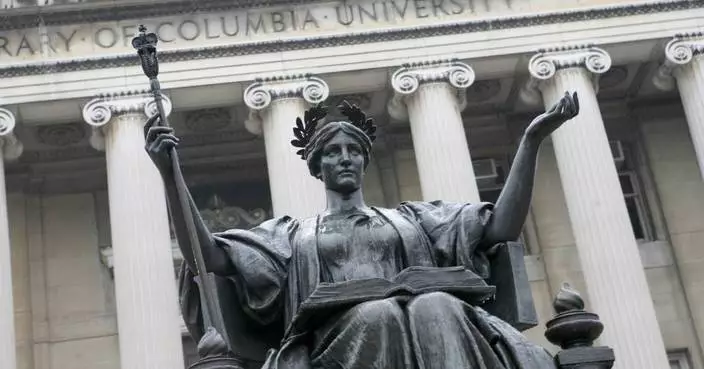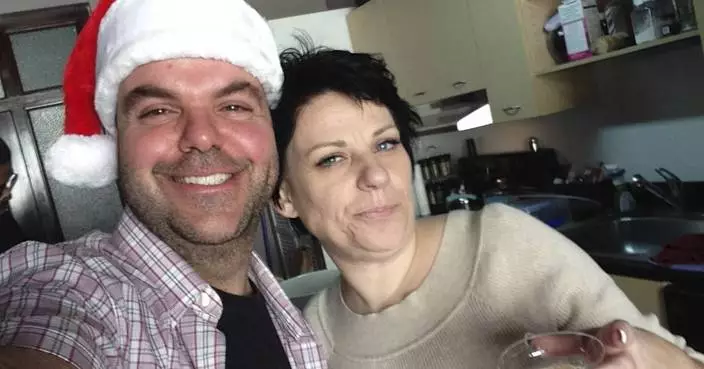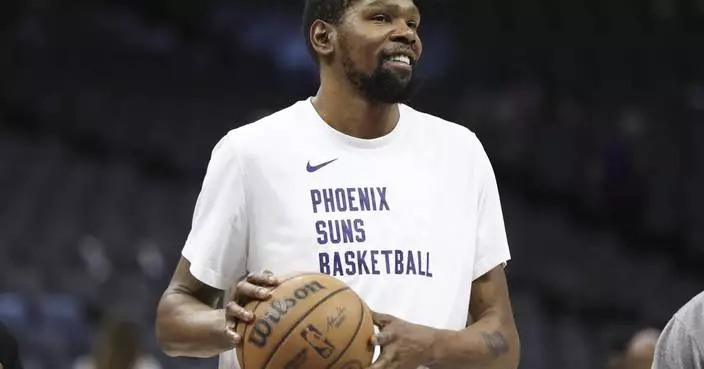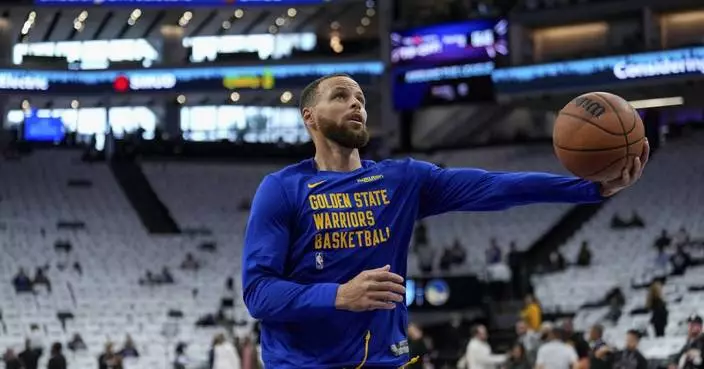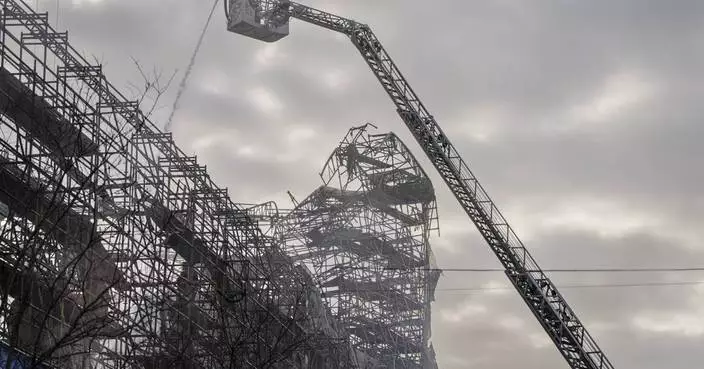She had always rooted only for Koreans. That was her home team and she believed they, exclusively, deserved her cheers.
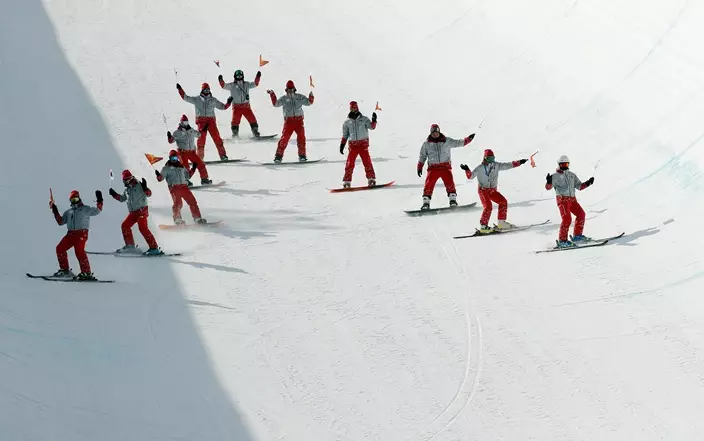
Volunteers prepare the course in between runs during the men's halfpipe final at Phoenix Snow Park at the 2018 Winter Olympics in Pyeongchang, South Korea, Thursday, Feb. 22, 2018. (AP Photo/Lee Jin-man)
She stood on the sidelines in the speedskating oval in her gray and red uniform, the ubiquitous getup of Pyeongchang's army of volunteers that allowed her closer to the action than most ordinary people. The Korean skater trailed in fourth place with little chance to make it to the podium. Until: a skater in front from a country 5,000 miles away crashed into the wall, and the Korean sped across the finish line in third place.
Click to Gallery
She had always rooted only for Koreans. That was her home team and she believed they, exclusively, deserved her cheers.
She stood on the sidelines in the speedskating oval in her gray and red uniform, the ubiquitous getup of Pyeongchang's army of volunteers that allowed her closer to the action than most ordinary people. The Korean skater trailed in fourth place with little chance to make it to the podium. Until: a skater in front from a country 5,000 miles away crashed into the wall, and the Korean sped across the finish line in third place.
It's a notion often lost in the modern games as athletes chase fame and sponsorships, corporate partnerships are calculated in the hundreds of millions and broadcasting rights in the billions:
To Shin, a 20-year-old college student in Seoul, it is payment enough to stand for a few seconds within spitting distance of history, to meet people and experience things that might cause her to see the world differently than she did before.
In the 2010 Olympics, 57 percent of volunteers were women. That rose to 70 percent during the Sochi games in 2014. In Korea, where young men face mandatory military service, 78 percent of people who applied to be volunteers were women, according to the local organizing committee.
The organizing committee apologized and promised to treat their free labor better.
Many get angry. Some scream.
Her manager chased the man down and he promised he'd come to apologize, but he never did. Hwang went home early that night. When she returned, she told them she didn't want to guard the gate anymore, and they agreed.
Exactly 30 years ago, Lucy Hwang's mother was her age and volunteered for the Olympics in Seoul.
She thought she would be ecstatic. But in the fallen skater's face she saw, up close, a million emotions — defeat, pain, regret.
"I'm not sure I should say this," Shin Ha-eun says. "But I felt bad for the person who fell more than I was happy about my athlete from Korea winning the bronze."
In that moment, she felt what Olympic organizers always describe the Olympic spirit to be.
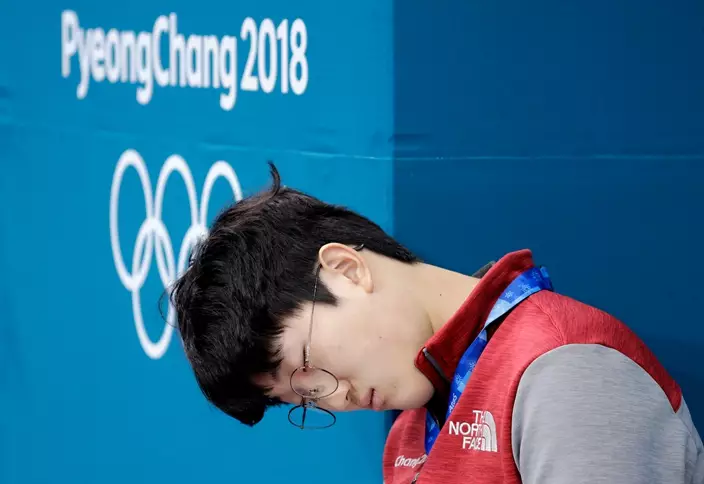
A volunteer rests during a break at the 2018 Winter Olympics in Gangneung, South Korea, Wednesday, Feb. 21, 2018. (AP Photo/Aaron Favila)
It's a notion often lost in the modern games as athletes chase fame and sponsorships, corporate partnerships are calculated in the hundreds of millions and broadcasting rights in the billions:
Underneath all that money is a workforce willing to run the Olympics for free.
Some volunteers are former athletes, some are doctors, one is a small-town mayor. They come from all over the world — Russia, China, the United States. The oldest is 88.
But the vast majority of volunteers in Pyeongchang are young Korean women.
There are thousands of them who do thousands of jobs, largely removed from the glamour of the Olympic spectacle: They direct traffic, help confused fans find their buses, shiver in security booths in the frigid cold. They save the Olympics millions of dollars in labor costs.
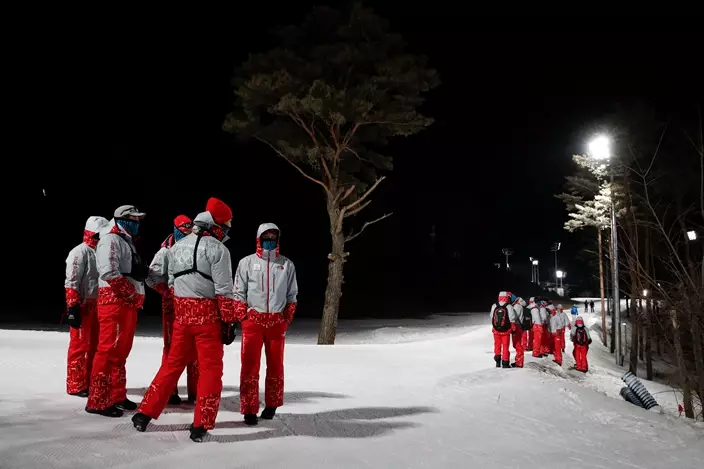
In this Saturday, Feb. 17, 2018 photo, workers and volunteers wait for the start of the women's 12.5-kilometer mass start biathlon at the 2018 Winter Olympics in Pyeongchang, South Korea. Their red pants and gray coats are ubiquitous at the Olympics games. (AP Photo/Jae C. Hong)
To Shin, a 20-year-old college student in Seoul, it is payment enough to stand for a few seconds within spitting distance of history, to meet people and experience things that might cause her to see the world differently than she did before.
So she often shows up at the Gangneung Oval hours before her shift is supposed to begin.
"Just for the kick of it," she says.
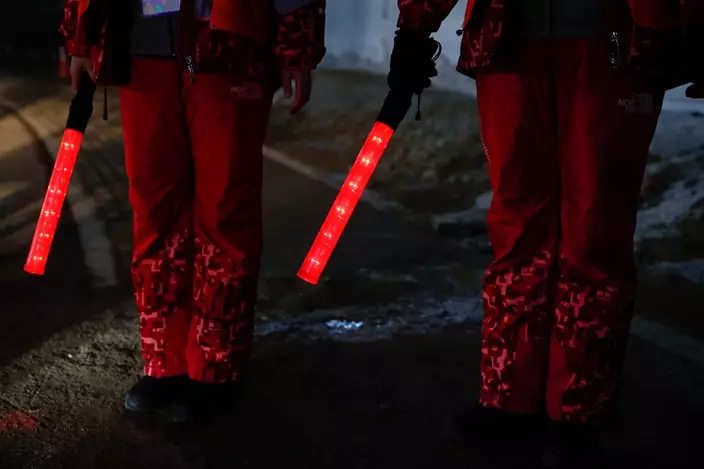
In this Sunday, Feb. 18, 2018 photo, two volunteers hold traffic wands at a bus stop near the Alpensia Ski Jumping Center at the 2018 Winter Olympics in Pyeongchang, South Korea. Their red pants and gray coats are ubiquitous at the Olympics games.(AP Photo/Jae C. Hong)
In the 2010 Olympics, 57 percent of volunteers were women. That rose to 70 percent during the Sochi games in 2014. In Korea, where young men face mandatory military service, 78 percent of people who applied to be volunteers were women, according to the local organizing committee.
In the early days of the games, local media reports were filled with stories of disgruntled volunteers leaving early. Their complaints included shoddy living conditions, bad food, cold showers and being left in the sub-zero weather waiting indefinitely for the bus to shuttle them to crowded dormitories hours away.
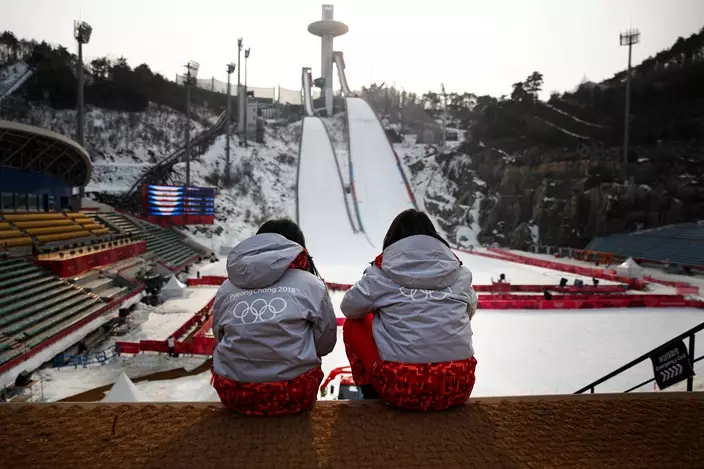
In this Sunday, Feb. 18, 2018 photo, two volunteers take a break at the Alpensia Ski Jumping Center at the 2018 Winter Olympics in Pyeongchang, South Korea. Their red pants and gray coats are ubiquitous at the Olympics games. The army of thousands of volunteers do everything from food service to car parking to guarding the Zambonis backstage at the Gangneung Oval. (AP Photo/Jae C. Hong)
The organizing committee apologized and promised to treat their free labor better.
An Norovirus outbreak swept through the games, infecting dozens of volunteers and leaving others in quarantine. And still more than 14,000 volunteers trudged on through the games, through the cold and the long drives on shuttle buses and occasional bouts of abuse.
Shin's team at the Gangnueng Oval guards a gate that blocking a short stretch of the hallway circling the arena, where they park the Zambonis. The job of these young women is to stop anyone who tries to pass, and tell them they have to turn and walk all the way around the other way. It's a 20-minute inconvenience for athletes, photographers and executives in a hurry to get where they need to be.
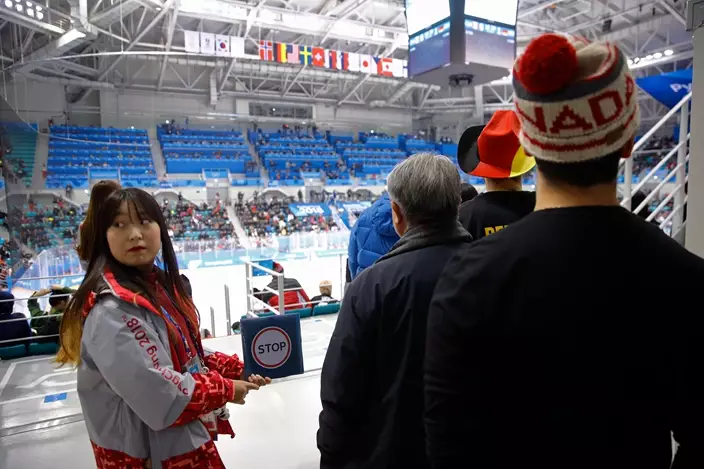
In this Feb. 23 2018 photo, a volunteer directs spectators to wait for a break in play before walking to their seats during a men's hockey semifinal round game between Canada and Germany at the 2018 Winter Olympics in Gangneung, South Korea. Empty seats, no NHL stars and often poor-quality hockey. (AP Photo/Patrick Semansky)
Many get angry. Some scream.
"I'm so sorry, you can't come through here," 22-year-old Lucy Hwang has said again and again, every night for weeks.
One executive, his temper flaring, began berating her, taking photographs of her badge and insisting he'd get her in trouble, in this job that she does for free.
"It got me so stressed out," she said, "and I told them I don't want to do this anymore."
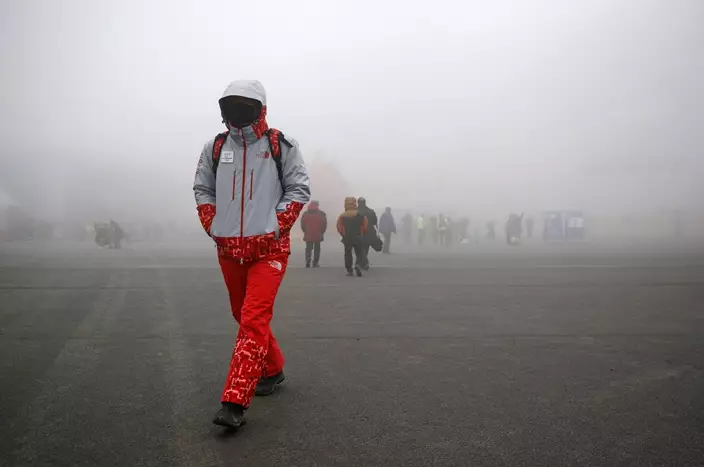
A volunteer walks in a foggy Pyeongchang Olympic Plaza during the 2018 Winter Olympics in Pyeongchang, South Korea, Saturday, Feb. 24, 2018. (AP Photo/Patrick Semansky)
Her manager chased the man down and he promised he'd come to apologize, but he never did. Hwang went home early that night. When she returned, she told them she didn't want to guard the gate anymore, and they agreed.
Hwang grew up here in Gangwon Province, a rural, down-on-its-luck former coal mining community that launched a years-long bid for the Olympics in an effort to remake itself as an international winter sports destination.
"It's what we've been longing for for a long time," she said. "The Olympics, it's a one-time experience in your life. That's a cliche. But it's true. I will never be at an Olympics in my town again."
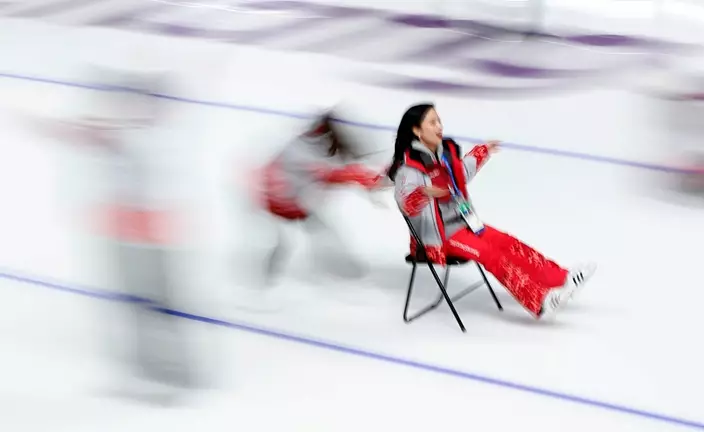
A volunteer pushes another volunteer on a chair on the ice after the last speedskating race at the Gangneung Oval at the 2018 Winter Olympics in Gangneung, South Korea, Saturday, Feb. 24, 2018. (AP Photo/Vadim Ghirda)
Exactly 30 years ago, Lucy Hwang's mother was her age and volunteered for the Olympics in Seoul.
The two women look exactly alike; their family and friends have a nickname for them in Korean that translates roughly to "30-year-apart twins." Hwang remembers when the announcement came on television that Pyeongchang had won the Olympics on its third try.
"My mom was like, 'Oh, my God, I'm having two Olympics in one life. And you should volunteer because I would again, but I'm too old now," Hwang recalls. "She says, 'I had Seoul, now you have Pyeongchang.'"
Hwang loves that people can spot the volunteers because of their loud and matching uniforms. Once, a group of photographers asked her for a bar recommendation. She gave them directions to one of her favorites, and they invited her to come along. She did, and now she has friends from Serbia, from the Czech Republic, from Japan.
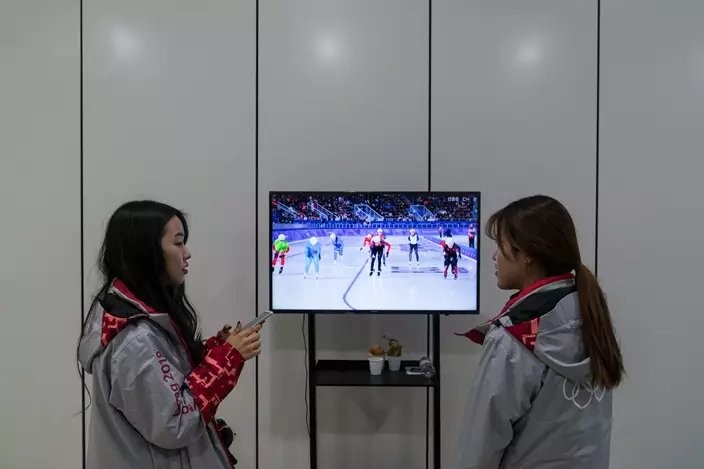
In this Saturday, Feb. 24, 2018 photo, volunteers Shin Ha-eun, left, and Jusun Kang watch a speed skating competition on a television while guarding a gate inside the Gangnueng Oval at the 2018 Winter Olympics in Gangneung, South Korea.(AP Photo/Felipe Dana)
She's been busy, so she didn't have time to think too much about all she had seen. On her last night at the oval, she said she wished she could have just a few more days.
"I realize it is actually so special to be here," she said.
Her one complaint: those loud gray-and-red uniforms.
In her normal life, she wears what she describes as the "Korean girl uniform": skinny jeans and hoodies. The volunteer uniforms are baggy gray jackets, trimmed with a bright-red, pixelated compilation of the Korean alphabet, Hangul. The pattern is on the ski pants and the lining of the boots they have all had to wear, every day, for weeks. She and some of her new friends joke that the red motif looks like "marbled beef."
"We're all like, 'The designer should wear this all the time so he has to know the humiliation,'" she says.
Then another lost fan spotted the marbled beef print in the crowd, pegged her as a volunteer and asked for directions.
NEW YORK (AP) — Shaina Taub was in the audience at “Suffs,” her buzzy and timely new musical about women’s suffrage, when she spied something that delighted her.
It was intermission, and Taub, both creator and star, had been watching her understudy perform at a matinee preview last week. Suddenly, she saw audience members searching the Wikipedia pages of key figures portrayed in the show: women like Ida B. Wells, Inez Milholland and Alice Paul, who not only spearheaded the suffrage fight but also wrote the Equal Rights Amendment ( still not law, but that’s a whole other story).
“I was like, that’s my goal, exactly that!” Taub, who plays Paul, said from her dressing room later. “Do everything I can to make you fall in love with these women, root for them, care about them. So that was a really satisfying moment to witness.”
Satisfying but sobering, too. Fact is, few audience members know much about the American suffrage movement. So the all-female creative team behind “Suffs,” which had a high-profile off-Broadway run and opens Thursday on Broadway with extensive revisions, knows they’re starting from zero.
It’s an opportunity, says Taub, who studied social movements — but not suffrage — at New York University. But it’s also a huge challenge: How do you educate but also entertain?
One member of the “Suffs” team has an especially poignant connection to the material. That would be producer Hillary Clinton.
She was, of course, the first woman to win the U.S. presidential nomination of a major party, and the first to win the popular vote. But Clinton says she never studied the suffrage movement in school, even at Wellesley. Only later in life did she fill in the gap, including a visit as first lady to Seneca Falls, home to the first American women’s rights convention some 70 years before the 19th Amendment gave women the vote.
“I became very interested in women’s history through my own work, and writing and reading,” Clinton told The Associated Press. And so, seeing “Suffs” off-Broadway, “I was thrilled because it just helps to fill a big gap in our awareness of the long, many-decades struggle for suffrage.”
It was Taub who wrote Clinton, asking her to come on board. “I thought about it for a nanosecond,” Clinton says, “and decided absolutely, I wanted to help lift up this production.” A known theater lover, Clinton describes traveling often to New York as a college student and angling for discounts, often seeing only the second act, when she could get in for free. “For years, I’d only seen the second act of ‘Hair,’” she quips.
Clinton then reached out to Malala Yousafzai, whom Taub had also written about becoming a producer. As secretary of state, Clinton had gotten to know the Pakistani education activist who was shot by a Taliban gunman at age 15. Clinton wanted Yousafzai to know she was involved and hoped the Nobel Peace Prize winner would be, too.
“I’m thrilled," Clinton says of Yousafzai’s involvement, “because yes, this is an American story, but the pushback against women’s rights going on at this moment in history is global.”
Yousafzai had also seen the show, directed by Leigh Silverman, and loved it. She, too, has been a longtime fan of musicals, though she notes her acting career both began and ended with a school skit in Pakistan, playing a not-very-nice male boss. Her own education about suffrage was limited to “one or two pages in a history book that talked about the suffrage movement in the U.K.,” where she’d moved for medical treatment.
“I still had no idea about the U.S. side of the story,” Yousafzai told the AP. It was a struggle among conflicting personalities, and a clash over priorities between older and younger activists but also between white suffragists and those of color — something the show addresses with the searing “Wait My Turn,” sung by Nikki M. James as Wells, the Black activist and journalist.
“This musical has really helped me see activism from a different lens,” says Yousafzai. “I was able to take a deep breath and realize that yes, we’re all humans and it requires resilience and determination, conversation, open-mindedness … and along the way you need to show you're listening to the right perspectives and including everyone in your activism.”
When asked for feedback by the “Suffs" team, Yousafzai says she replied that she loved the show just as it was. (She paid a visit to the cast last month, and toured backstage.) Clinton, who has attended rehearsals, quips: “I sent notes, because I was told that’s what producers do.”
Clinton adds: “I love the changes. It takes a lot of work to get the storytelling right — to decide what should be sung versus spoken, how to make sure it’s not just telling a piece of history, but is entertaining.”
Indeed, the off-Broadway version was criticized by some as feeling too much like a history lesson. The new version feels faster and lighter, with a greater emphasis on humor — even in a show that details hunger strikes and forced feedings.
One moment where the humor shines through: a new song titled “Great American Bitch” that begins with a suffragist noting a man had called her, well, a bitch. The song reclaims the word with joy and laughter. Taub says this moment — and another where an effigy of President Woodrow Wilson (played by Grace McLean, in a cast that's all female or nonbinary) is burned — has been a hit with audiences.
“As much as the show has changed,” she says, “the spine of it is the same. A lot of what I got rid of was just like clearing brush.”
Most of the original cast has returned. Jenn Colella plays Carrie Chapman Catt, an old-guard suffragist who clashed with the younger Paul over tactics and timing. James returns as Wells, while Milholland, played by Phillipa Soo off-Broadway, is now played by Hannah Cruz.
Given its parallels to a certain Lin-Manuel Miranda blockbuster about the Founding Fathers, it’s perhaps not a surprise that the show has been dubbed “Hermilton” by some.
“I have to say,” Clinton says of Taub, “I think she’s doing for this part of American history what Lin did for our founders — making it alive, approachable, understandable. I’m hoping ‘Suffs’ has the same impact ‘Hamilton’ had.”
That may seem a tall order, but producers have been buoyed by audience reaction. “They’re laughing even more than we thought they would at the parts we think are funny, and cheering at other parts,” Clinton says. A particular cheer comes at the end, when Paul proposes the ERA. “A cast member said, ‘Who’d have ever thought the Equal Rights Amendment would get cheers in a Broadway theater?’” Clinton recalls.
One clear advantage the show surely has: timeliness. During the off-Broadway run, news emerged the Supreme Court was preparing to overturn Roe vs. Wade, fueling a palpable sense of urgency in the audience. The Broadway run begins as abortion rights are again in the news — and a key issue in the presidential election only months away.
Taub takes the long view. She’s been working on the show for a decade, and says something's always happening to make it timely.
“I think,” she muses, “it just shows the time is always right to learn about women’s history.”
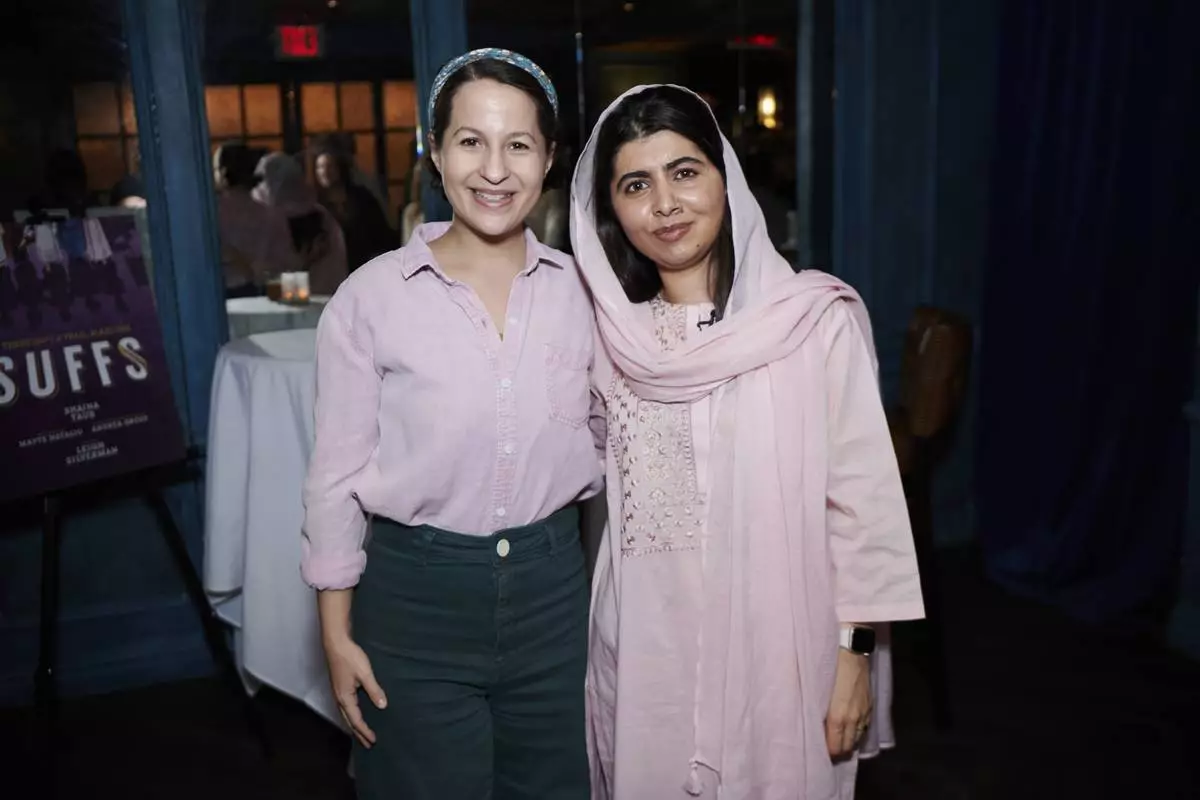
This photo provided by Rubenstein shows Malala Yousafzai, right, and and Shaina Taub, creator and star of “Suffs” pose. Yousafzai and former Secretary of State Hillary Rodham Clinton are joining together as producers of the musical about the suffragist movement. (Jenny Anderson via AP)
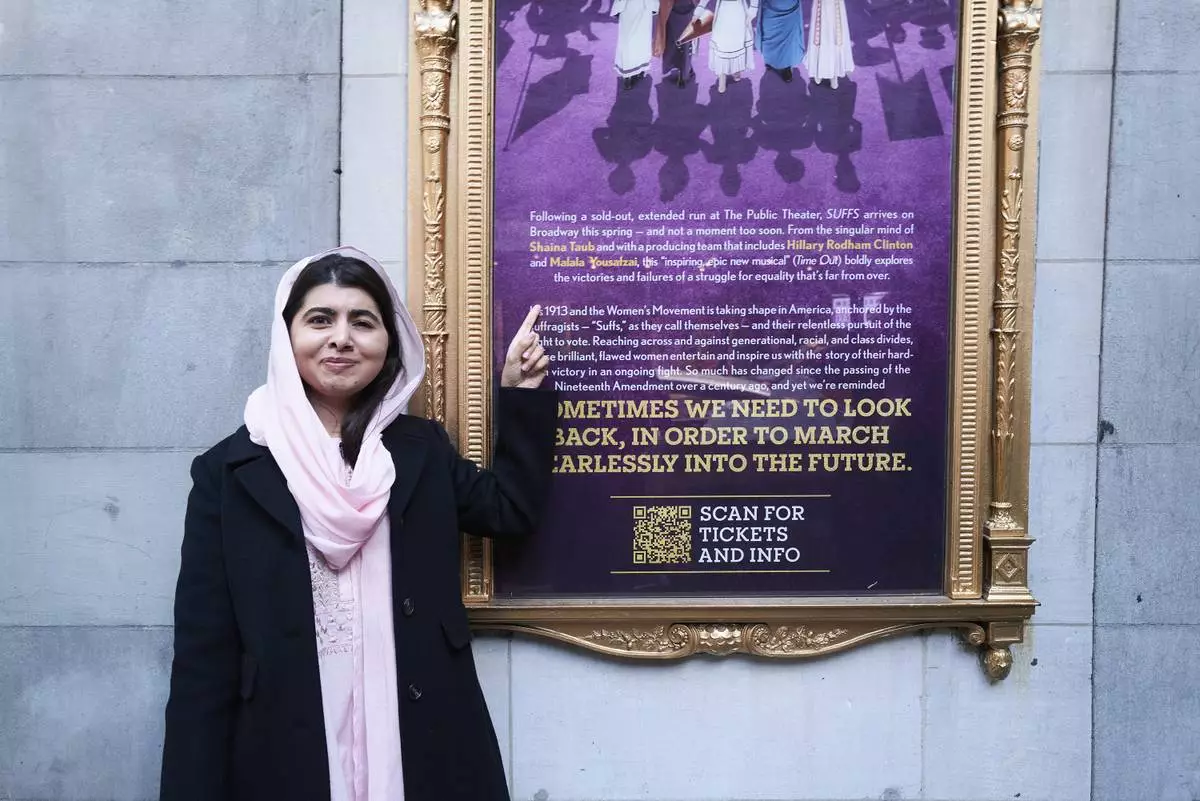
This photo provided by Rubenstein shows Malala Yousafzai pointing to a sign for her off-Broadway musical “Suffs” in New York. Yousafzai and former Secretary of State Hillary Rodham Clinton are joining together as producers of the musical about the suffragist movement. (Jenny Anderson via AP)
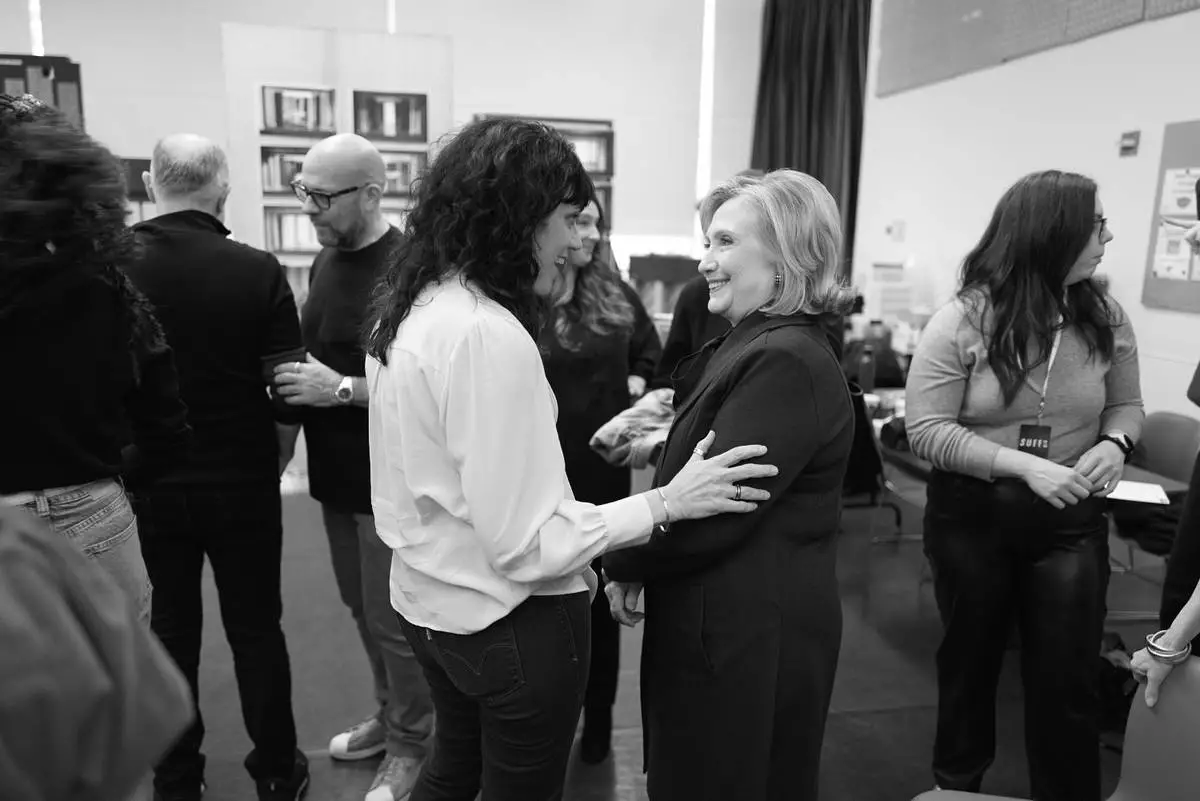
This photo provided by Rubenstein shows Director Leigh Silverman talking with former Secretary of State Hillary Rodham Clinton during a rehearsal for the off-Broadway musical “Suffs” in New York. Clinton and Shaina Taub are joining together as producers of the musical about the suffragist movement. (Jenny Anderson via AP)















